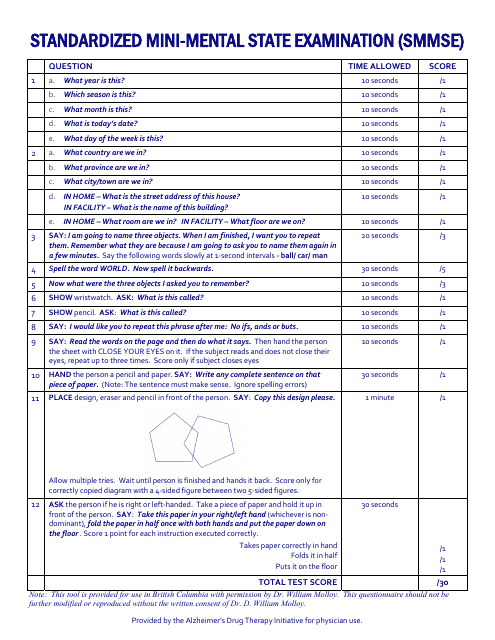Free Mini Mental Status Exam Forms and MMSE Templates
What Is the Mini-Mental Status Exam?
The Mini-Mental Exam is a 30-score test used to measure the cognitive state of a patient. For this purpose, physicians use the MMSE form – a simple questionnaire containing questions and tasks determining the areas of difficulties for the patient. This paper-based test is a convenient tool used to measure cognitive impairment and to document its progression or regression in the course of time. The latter allows doctors to track the patient’s response to the prescribed treatment.
The forms used to administer Mini-Mental State Examination - also called the Mini-Mental Status Examination or the MMSE - have several versions. The questionnaires are often customized to meet the needs of the blind, deaf, or partially immobilized patients. At the same time, all of them share the similar questions and tasks needed to check short-term memory, immediate memory, orientation to time, orientation to place, response to complex commands, language understanding, and ability to concentrate. MMSE form is not normally used as a sole instrument to diagnose a specific type of cognitive impairment. Its main aim is to check whether any mental problems are present and to record the results required to substantiate the necessity for further evaluation.
Who Can Administer MMSE?
The Mini-Mental state exam is regularly used in clinical or research settings. It can be administered by a physician, nurse, or a proper-trained assistant. It is important for an individual conducting the exam to be trained in ethics. The whole process requires tact and sensitivity in order to reassure patients showing embarrassment on their inability to answer the questions and so you can conduct the test effectively.
Documents:
1
This Form is used for conducting a standardized assessment of cognitive function as part of the Alzheimer's Drug Therapy Initiative in British Columbia, Canada.

